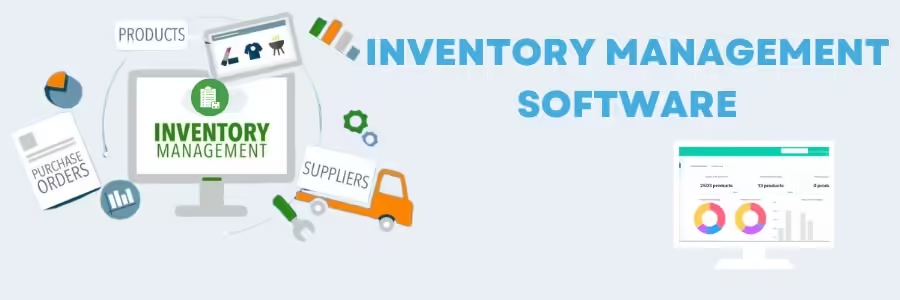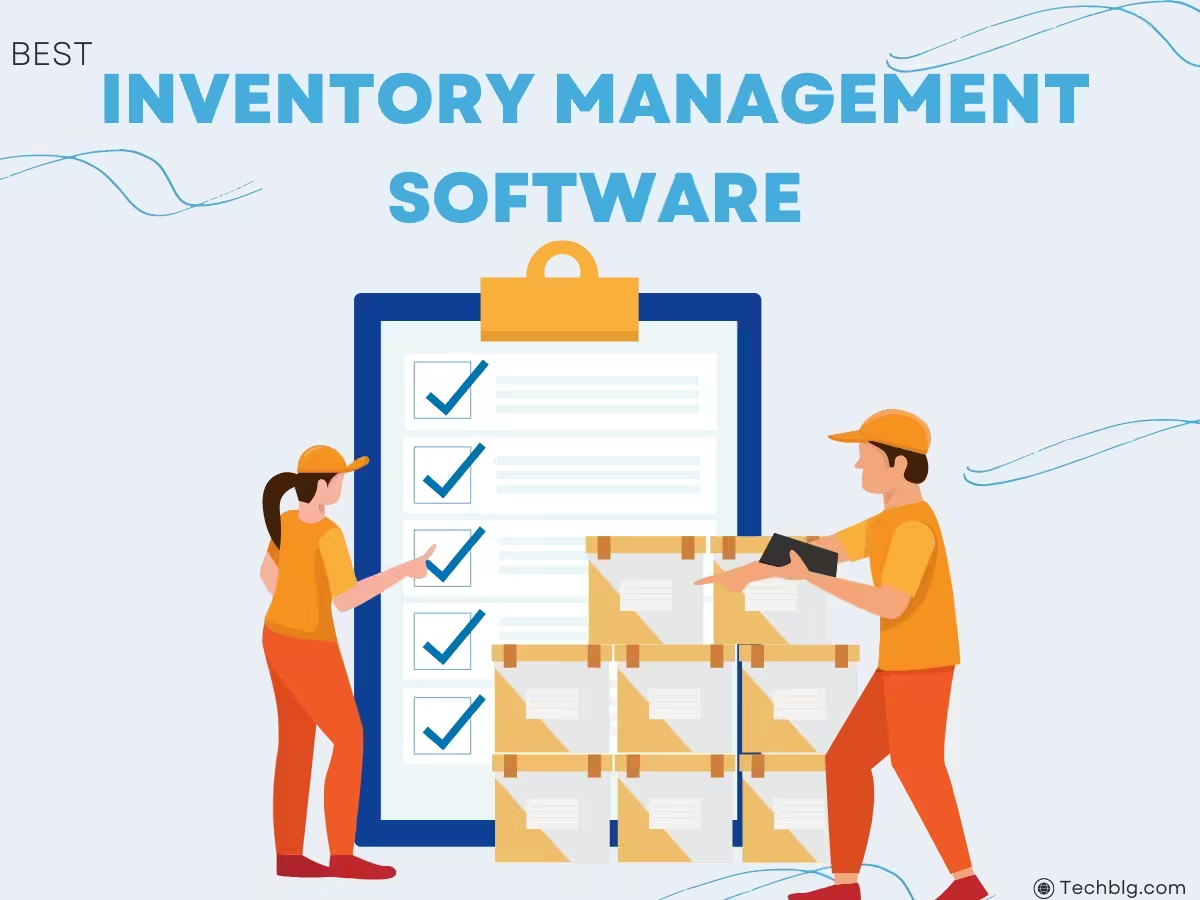Introduction
Selecting the best inventory management software is crucial for optimizing stock levels, managing sales, and ensuring seamless operations, especially for small and medium-sized businesses. With the right inventory management system, you can automate tracking, minimize errors, and improve overall efficiency. In this article, we will explore five of the best inventory management software options, their features, pricing, and the pros and cons, helping you choose the solution that best fits your business. We will also touch on Best Billing Software for Small Business, best small business accounting software, and Best CRM for Small Business of 2024 to give a comprehensive understanding of key business tools.
What Is Inventory Management Software?
Inventory management is more than just tracking stock levels in your warehouse or retail space. It involves overseeing everything from individual parts to the components used in creating finished products and services. Additionally, it includes monitoring inventory levels of your suppliers and key customers. For small to midsize businesses (SMBs), managing this information can quickly become overwhelming, especially when relying on basic spreadsheets. To effectively integrate inventory data with other organizational systems, dedicated inventory management software is essential. Choosing the right software involves balancing necessary features with cost, which is why we’ve reviewed and compared nine leading inventory management solutions to assist you in this decision-making process.So What is The Best inventory management software ?.

Customizable Open Source Inventory Management Software for Your small Business
Open-source inventory management software offers flexibility, enabling customization to meet your specific business needs. Options like Odoo, ERPNext, and PartKeepr are popular for their scalability, allowing you to host on local servers or cloud hosting platforms. These tools can be tailored to integrate seamlessly with your existing systems. However, customization requires technical expertise, which is why hiring a Fiverr expert is highly recommended. For more insight, check out How to Find the Right Fiverr Expert to ensure you find a qualified professional for the task.
Table of Contents for Best inventory management software
Conditions for Choosing an Inventory Management Software System
Selecting the best inventory management software is crucial for streamlining operations and ensuring business success. Here are the key conditions to consider:
- Scalability: The software should grow with your business, supporting additional inventory, locations, or product lines.
- Integration: Seamless integration with existing tools like CRM, ERP, or accounting software ensures efficient data flow.
- User-Friendliness: A user-friendly interface reduces the learning curve for employees, enhancing productivity.
- Real-Time Tracking: The ability to monitor inventory in real-time helps prevent overstocking or shortages.
- Custom Reporting: Tailored reports provide insights into stock levels, sales, and reordering needs.
- Automation: Automated features like order replenishment or notifications improve efficiency.
- Cost: Choose software that fits your budget while offering comprehensive features.
- Customer Support: Reliable customer support is crucial to resolve issues quickly.
The importance of inventory management software cannot be overstated. It enables businesses to avoid costly errors, maintain adequate stock levels, improve forecasting, and streamline the entire supply chain process. Good inventory management tools contribute to better decision-making and ultimately improve profitability.
AI-Powered Inventory Management Tools
In today’s digital landscape, businesses are turning to AI-powered inventory management tools to optimize operations. AI can predict stock needs based on historical data, allowing companies to prevent overstock and minimize shortages. Tools like Sowingo and Clear Spider offer advanced algorithms to automate stock replenishment, detect inventory patterns, and make data-driven decisions. AI-powered solutions help businesses save time and reduce costs by optimizing purchasing strategies in real-time. This type of automation future-proofs your business against market fluctuations and changing consumer demands.
By integrating AI with traditional inventory management systems, businesses gain an edge in agility and efficiency. The combination of real-time tracking, predictive analytics, and automated processes makes AI-driven inventory systems a strategic investment for growth.
This approach complements ERP systems, allowing for full operational synergy, connecting inventory with sales, accounting, and supply chain management.
1. Zoho Inventory
Zoho Inventory is a robust, cloud-based inventory management solution designed for small and medium-sized businesses. It offers a comprehensive set of features, making it one of the best inventory management software for businesses looking for seamless integration with other apps like Shopify and Amazon.
Features:
- Multi-channel inventory management
- Order management and tracking
- Integrated with accounting tools (like Zoho Books)
- Stock adjustments and alerts
- Customizable reports
Pricing:
- Free plan: Supports up to 50 orders per month
- Basic plan: $39/month for 1,500 orders
- Premium plan: $129/month for 30,000 orders
Pros:
- Easy to use with integrations
- Strong analytics and reporting tools
- Free plan available for startups
Cons:
- Limited advanced features in lower-tier plans
- User interface can be a bit complex for beginners
2. TradeGecko (now QuickBooks Commerce)
TradeGecko, rebranded as QuickBooks Commerce, is an all-in-one inventory and order management platform. Known for its user-friendly interface and robust integrations, it’s ideal for small businesses that need to sync inventory with accounting software.
Features:
- Multi-channel sales order management
- Real-time inventory tracking
- Integration with QuickBooks, Xero, Shopify, and Amazon
- B2B eCommerce platform included
Pricing:
- Starts at $39/month
- Premium plans: Up to $199/month depending on order volume
Pros:
- Seamless integration with QuickBooks
- Multi-currency support
- Real-time analytics
Cons:
- Pricing can be steep for small businesses
- Some features are behind higher-tier plans
3. Ordoro
Ordoro is a powerful, cloud-based software designed for businesses that need to manage multiple warehouses, shipping, and inventory. It offers an extensive feature set that is well-suited for eCommerce businesses.
Features:
- Dropshipping automation
- Barcode scanning
- Inventory tracking across multiple warehouses
- Integrated shipping and supplier management
Pricing:
- Express plan: $59/month
- Pro plan: $499/month
Pros:
- Excellent shipping integrations
- Easy to use
- Multi-channel sales management
Cons:
- Higher pricing for advanced features
- More suited for mid-sized businesses than very small ones
4. Cin7
Cin7 is a highly customizable inventory management solution that offers end-to-end control over inventory, sales channels, and orders. It’s perfect for businesses that operate on multiple channels and need to centralize their management.
Features:
- Real-time stock updates
- Seamless integration with eCommerce platforms
- Centralized inventory management
- Retail, wholesale, and manufacturing support
Pricing:
- Standard plans start at $299/month
Pros:
- Great for larger, multi-channel businesses
- Extensive customization options
- Powerful reporting tools
Cons:
- High cost
- Can be overwhelming for small businesses
5. Odoo Inventory
Odoo Inventory is part of the Odoo suite of business apps, offering a scalable solution for businesses of all sizes. It’s especially well-suited for companies that want an integrated suite of tools, including CRM, accounting, and project management.
Features:
- Double-entry inventory system
- Real-time product tracking
- Barcode scanning and automated replenishment
- Multi-warehouse management
Pricing:
- Free for a single app (Inventory); additional apps start at $24/user/month
Pros:
- Highly customizable
- Integrated with other Odoo apps (CRM, accounting)
- Supports complex workflows
Cons:
- Steeper learning curve
- Requires additional apps for full functionality
Best Inventory Management Software for Restaurants
Restaurant businesses often face unique challenges when managing their inventory, including handling perishable goods, seasonal demand fluctuations, and high turnover rates. Some of the best inventory management software for restaurants include platforms like MarketMan, Square for Restaurants, and BlueCart. These tools help restaurants monitor stock levels, automate replenishment, and reduce waste through accurate demand forecasting. Integrating billing and inventory software can streamline restaurant operations by linking the purchasing process directly to inventory tracking and sales.
Integrating Inventory Control Programs with Inventory Management Systems for Efficient Stock Handling
Inventory control programs and inventory management systems work together to ensure seamless stock handling. While inventory control programs focus on maintaining optimal stock levels and preventing overstock or shortages, inventory management systems take a broader approach by integrating control with other crucial aspects like demand forecasting, supplier management, and order processing. Combining both ensures accurate tracking of stock quantities and a smooth flow from procurement to sale, ultimately enhancing operational efficiency, reducing costs, and boosting customer satisfaction. The two systems complement each other for holistic inventory management.
Top 10 Questions About Inventory Management Software
- What is inventory management software? Inventory management software helps businesses track, manage, and organize their stock, orders, and supply chain efficiently.
- Why is inventory management important for small businesses? Effective inventory management prevents stockouts, reduces carrying costs, and enhances customer satisfaction by ensuring products are available when needed.
- What are the benefits of using inventory management software? Benefits include real-time tracking, automation of stock levels, improved accuracy, reduced human error, and better demand forecasting.
- What’s the difference between inventory and stock management software? The terms are often used interchangeably, but stock management typically refers to the management of goods in hand, while inventory management covers the broader process, including orders and supply chain logistics.
- How does cloud-based inventory software work? Cloud-based inventory software stores all data online, allowing real-time access from any location and device with internet access.
- Is there free stock management software available for small businesses? Yes, there are free versions like Zoho Inventory and Odoo, which offer basic features and can be upgraded as the business grows.
- Can inventory management software integrate with other business tools? Yes, most modern inventory software integrates with eCommerce platforms, accounting software, and CRM tools.
- Which inventory management software is best for small retail businesses? Zoho Inventory, QuickBooks Commerce, and TradeGecko are popular choices for small retail businesses.
- How do I choose the best inventory management system? Consider your business size, budget, integration needs, and specific industry requirements before selecting a system.
- What is the cost of inventory management software for small businesses? Pricing varies, with some free options and paid plans starting from $39/month to over $300/month for advanced features.
Conclusion on Best inventory management software
Selecting the best inventory management software for your business is essential to maintaining optimal stock levels and ensuring smooth operations. Whether you are a small business exploring free stock management software or a larger company in need of advanced features, the right solution will help you streamline processes, reduce costs, and improve efficiency. For more comprehensive solutions, also explore tools like the Best Billing Software for Small Business, Best CRM for Small Business of 2024, and best small business accounting software, which complement inventory management in fostering business success.

Leave a Reply